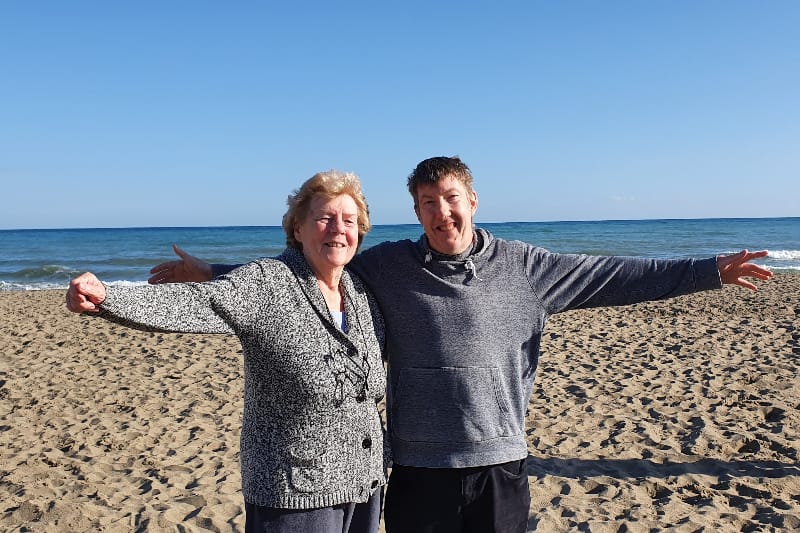Theatre Watch: Lost Memories
Gary Thomas explores the experience of being a carer to his mother.

Lost Memories is a multi-screen video installation that draws on screenwriter Gary Thomas’ experience of being a carer to his mother, who had Alzheimer’s Disease. Combining documentary phone footage with fictional sequences, Gary’s film installation will be shown in five locations across the UK from June to November.
I caught up with Gary for a behind-the-scenes look at this piece of work.
You've said that you started recording moments of your time with your mother without knowing if anyone would ever see what you'd recorded - when did you start to realise that you wanted to build this into the film that you've created?
I’m first and foremost a writer, and most things I do stem from that, with the exception of photography, which thanks to mobile phones, also includes video.
I started recording how my mother was, first really as evidence, so I could show people how she was with her Alzheimer’s if it was ever needed. Beyond that I never really thought about it at the time.
Then, during covid, I was looking for a project I could do at home, and I had these videos of my phone, so I could tell people what it was like caring for someone elderly and with Alzheimer’s, so that became my next Arts Council application.
Was it complicated - emotionally - to blend dramatised elements with the documentary/real-life moments?
I played me, and because I also recorded things by audio when I couldn’t film them, the dramatised part came from actual transcript.
The most difficult part was deciding which parts of the real life journey to include.
It was actually fun doing the doctor scene because that’s my first time acting in something.
What happens when I make personal work is that I get to talk about it to different people, so by the time it came to filming I’d already talked about it quite a bit, so it didn’t really feel complicated emotionally because this film gave me the space to talk about what was going on in real life.
Alzheimer’s seems to be particularly brutal on the loved-ones who are caring for someone afflicted. Did you find that drawing on that experience to create this film was somehow helpful in processing the trauma of all of that?
Yes, definitely! It allowed me to talk about it more, and to more people outside of those I knew.
One great thing is I got to talk to scientist Liz Sampson. The interview was longer that what was in the film, but I got to gain a greater understanding from that.
Also, what I love, and this was a main point in making it, is that others who have gone through similar situations immediately start talking about it, and it’s opened up that conversation which could be very difficult to have.
You've said that one of your objectives with this work is to film the moments of clarity and the joy within the experience of caregiving for someone with Alzheimer's. Do you have any advice or guidance for people in that care-giving role to try and help them identify and celebrate those moments of clarity and joy?
For the memories of me with my mum, I had a sort of list in my head of what I wanted in the film.
I worked with David Parker to make the film, so as editor he watched all the clips, which was useful. It’s great to have a second pair of eyes on the film.
I think filming stuff is really great to build memories of happy times. Photos are too, and in someways are more accessible as you can make a photo book with happy memories. That is the trouble with photos on the phone, they tend to just sit there, but making something out of those photos (and learning how to do this) is a great way of celebrating those times.
I know my mum and many others with Alzheimer’s love music, so watching concerts on TV was great with my mum, she always loved the music of Andre Rieu, and we’d watch them together, we also danced to them. Those are happy memories.
What do you hope people feel when they're experiencing your presentation of Lost Memories?
I hope carers will feel some sense that there will be happy times, and happy moments that they can share with their loved one. And that also it does get easier as time goes on.
I also hope that it will give people space to talk about this subject more, as it’s definitely not talked about enough.
Dates
- 14th-16th June St Anne’s House, Brislington, Bristol BS4 4AB
- 3rd-7th September Worthing Gallery, Colonnade House, 47 Warwick Street, Worthing BN11 3DH
- 17th-21st September Paignton Library, Great Western Road, Paignton TQ4 5AG
- October 2024 Victoria Pavilion, Victoria Pleasure Ground, New Town, Uckfield TN22 5DJ
- 5th-10th November Library at the Lightbox, 1 The Glass Works, Barnsley S70 1GW